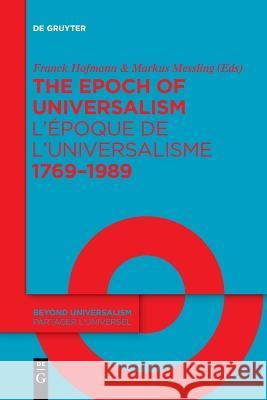The Epoch of Universalism 1769-1989 / L'époque de l'universalisme 1769-1989 » książka
The Epoch of Universalism 1769-1989 / L'époque de l'universalisme 1769-1989
ISBN-13: 9783110995183 / Angielski / Miękka / 2022 / 250 str.
The Epoch of Universalism 1769-1989 / L'époque de l'universalisme 1769-1989
ISBN-13: 9783110995183 / Angielski / Miękka / 2022 / 250 str.
(netto: 109,16 VAT: 5%)
Najniższa cena z 30 dni: 106,76
ok. 16-18 dni roboczych.
Darmowa dostawa!
2019 witnessed the 30th anniversary of the German reunification. But the remembrance of the fall of the Berlin Wall coincided with another event of global importance that caught much less attention: the 250th anniversary of Napoleon Bonaparte's birth. There is an undeniable historical and philosophical dimension to this coincidence. Napoleon's appearance on the scene of world history seems to embody European universalism (soon thereafter in the form of a 'modern' imperial project); whilst scholars such as Francis Fukuyama saw in the events of 1989 its historical fulfilment. Today, we see more clearly that the fall of the Berlin Wall stands for an epistemic earthquake, which generated a world that can no longer be grasped through universal concepts. Here, we deal with the idea of Europe and of its relation to the world itself. Picking up on this contingency of world history with an ironic wink, the volume analyses in retrospect the epoch of European universalism. It focusses on its dialectics, polemically addressing and remembering both 1769 and 1989. L'annee 2019 a ete marquee par le 30e anniversaire de la reunification de l'Allemagne, eclipsant un autre evenement d'envergure mondiale : le 250e anniversaire de Napoleon Bonaparte. La dimension philosophico-historique de cette coincidence ne peut pourtant pas etre negligee : si l'arrivee de Bonaparte sur la scene de l'histoire mondiale semble incarner l'avenement de l'universalisme europeen (bientot amene a prendre sa forme " moderne " et imperiale), certains penseurs ont suggere, avec Francis Fukuyama, que " 1989 " marquait son accomplissement historique. Aujourd'hui, il apparait au contraire que la chute du mur de Berlin a ete un veritable tremblement de terre epistemique, et rendu inoperants les concepts universels. Dans le monde d'apres, c'est a l'idee d'Europe et a sa relation au monde que nous avons affaire. Revenant par un geste ironique sur cette contingence historique, le present volume se veut une analyse retrospective de l'epoque de l'universalisme, dans toute la dialectique que les commemorations de 1769/1989 ont fait surgir.











